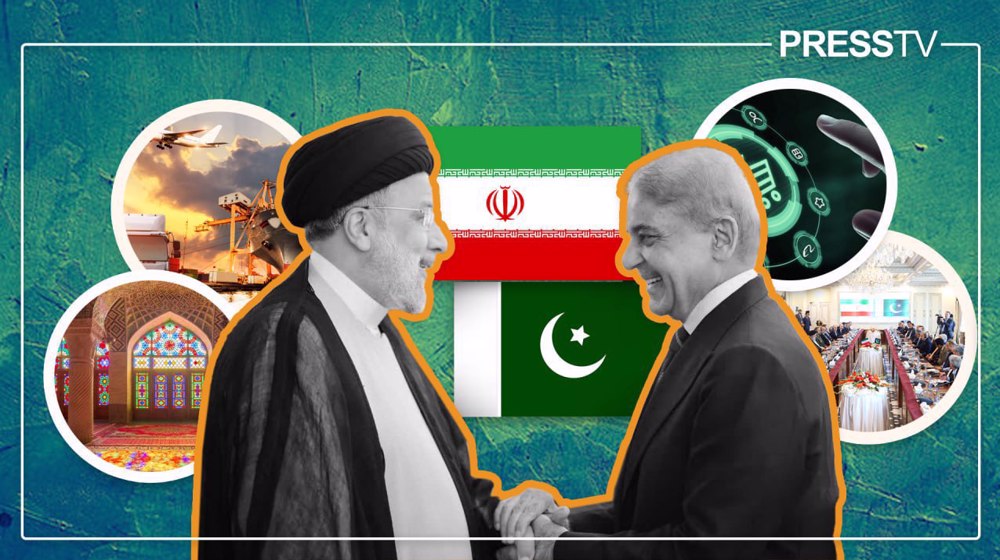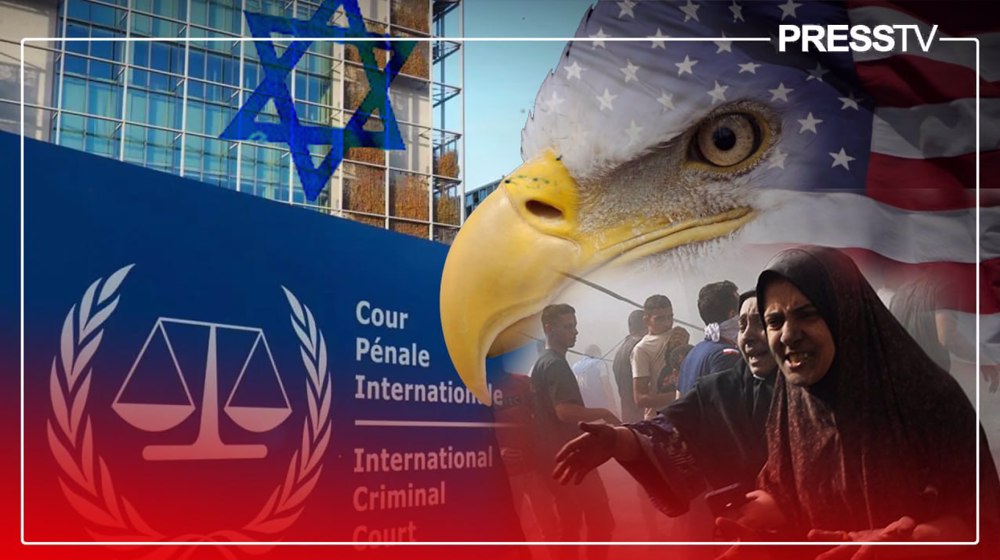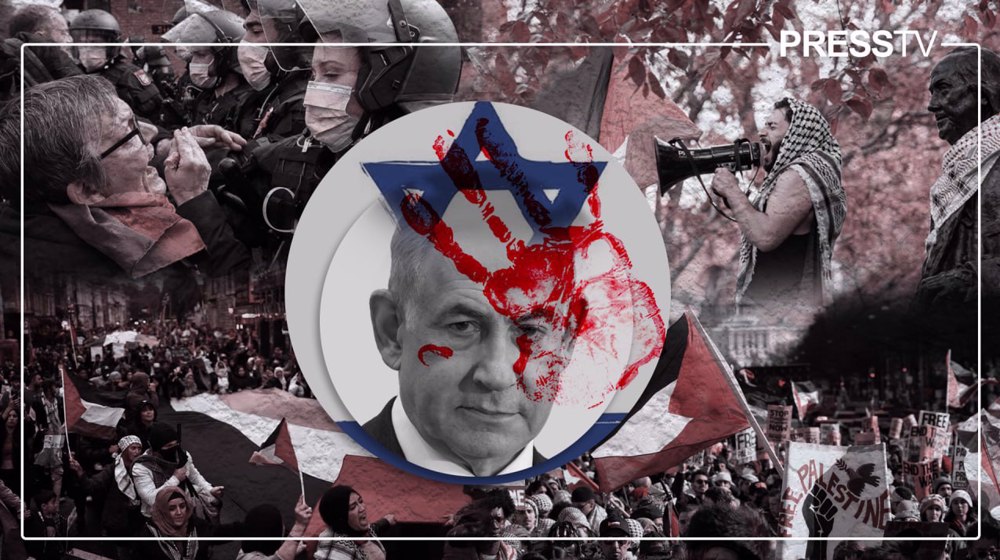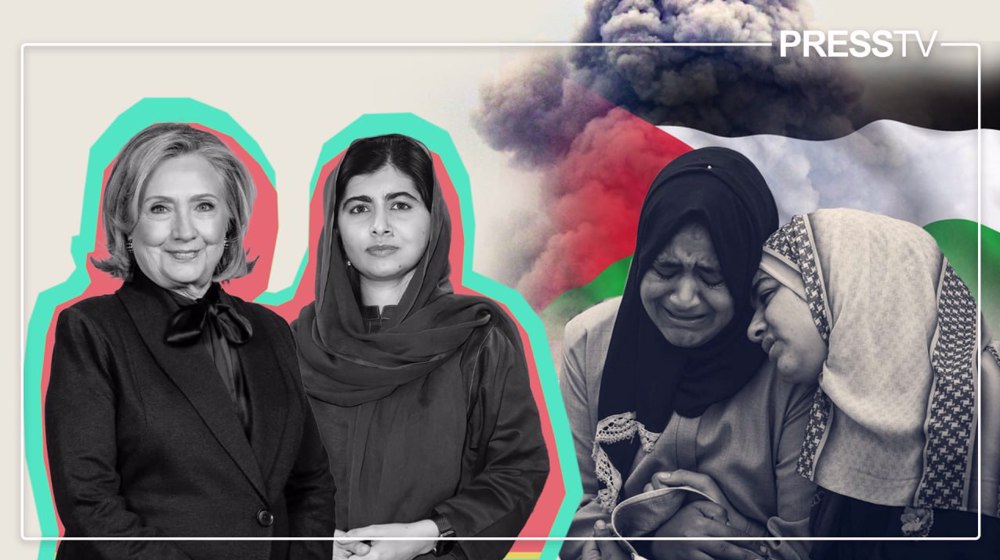President Raeisi’s historic visit opens new chapter in Iran-Pakistan ties
By Syeda Sana Batool
Amid heightened regional tensions and shifting alliances, Iranian President Ebrahim Raeisi’s first official visit to Pakistan this week was historic and opened a new chapter in Iran-Pakistan ties.
The significance of the visit is best illustrated by veiled warnings issued by the United States to Pakistan, warning against trade dealings with Iran and threatening potential sanctions.
The three-day landmark visit concluded with the two countries announcing plans to raise the volume of trade between them to $10 billion per year over the next five years, up from the current $2 billion.
Many documents of cooperation were inked by the two sides in the presence of President Raeisi and Pakistani Prime Minister Shehbaz Sharif in the areas of trade, science and technology, agriculture, health, culture as well as legal and judicial affairs.
The key objective of the visit from Iran’s perspective was to strengthen economic ties with Pakistan through discussions on economic, commercial, energy, and border cooperation, in line with the Raeisi government’s game-changing neighborhood-first policy.
From the Pakistani perspective, the visit provided an opportunity for Islamabad to expand cooperation with Tehran in areas of common interest and resolve all misunderstandings.
The visit was particularly seen as an attempt by the two Muslim-majority neighboring countries to mend fences following the missile launches from both sides in January.
Syed Ali, a financial analyst based in Pakistan, told the Press TV website that the visit was significant as it came months after cross-border attacks on terrorist camps, “making it crucial for restoring normalcy between the nations.”
Importantly, the Iranian president’s visit to Pakistan was announced soon after the top diplomats of the two countries held talks to allay the concerns of each other arising from the missile strikes.
The visit furthered Pakistan and Iran's efforts to reduce tensions and strengthen security cooperation. They pledged to combat terrorism within their borders and establish a system of ministerial-level consultations to oversee progress across multiple sectors.
Khwaja Burhan, a journalist and analyst based in Karachi, echoed this sentiment, describing the visit as a “breath of fresh air amidst tensions fuelled by the ongoing West Asia conflict.”
Despite Western sabre-rattling, he emphasized the potential benefits of completing ambitious projects such as the gas pipeline and free trade agreement and asserted that both nations could greatly benefit if they capitalize on the current momentum for cooperation.
US rattled by Raeisi’s Pakistan visit
The US Department of State on Tuesday warned the Pakistani government against dealing with Iran. In a news briefing, spokesperson Vedant Patel referred to the “potential risk” in engaging with Iran.
“We advise anyone considering business deals with Iran to be aware of the potential risk of sanctions. But ultimately, the government of Pakistan can speak to their own foreign policy pursuits.”
Patel also discussed a US move last week to sanction three Chinese and one Belarusian firms for allegedly selling missile parts to Pakistan.
"The sanctions were made because these were entities that were proliferators of weapons of mass destruction and because of the means of their delivery," he said.
However, Pakistan's foreign office stated that the two nations reached an agreement to collaborate in the energy domain, encompassing electricity trade, power transmission infrastructure, and the Iran-Pakistan gas pipeline project.
The gas pipeline project has been stalled for over ten years due to political instability and global sanctions.The pipeline was initially planned to extend over 1,900km (1,180 miles) from Iran's South Pars gas field to Pakistan, aiming to fulfill Pakistan's increasing energy demands.
Last month, Pakistani authorities signaled their intention to request a waiver from the US for the pipeline's construction on its soil, while rejecting American opposition to the project.
Analyst Muhammad Faisal said the threat of sanctions from the United States is primarily aimed at deterring Pakistan and "raising the cost of engaging with Iran."
He added that the progress of formal trade and banking transactions between the two countries will likely be slow, as Pakistani banks hesitate to directly engage with Iranian counterparts.
President Raeisi said strengthening cooperation between the two sides, as two important Muslim countries in the region, can play an effective role in solving regional problems.
He hastened to add that the presence of foreigners in the region only compounds problems, referring to the United States and its allies.
Raeisi commends Pakistan’s ‘anti-Zionist stance’
Praising the people and government of Pakistan and their firm stance against the Zionist regime, President Raeisi said the two countries have a common stance on the Palestinian issue.
The Iranian president also warned that an Israeli attack on Iranian soil would result in a “drastic change in the situation,” including the “complete dissolution of the Zionist regime.”
During the meetings, both Islamabad and Tehran strongly condemned the Israeli regime's escalating aggression against Palestinians. They condemned the devastating humanitarian consequences of the Gaza genocide, including mounting casualties and the displacement of millions.
The two countries demanded an immediate ceasefire, unhindered humanitarian access to Gaza, the repatriation of displaced Palestinians, and justice for Israeli war crimes.
They emphasized their support for a just, comprehensive, and long-term resolution that aligns with Palestinian aspirations and struggle against the Israeli occupation.
President Raeisi urged all Muslim countries to forge unity, saying Israel is committing crimes against the oppressed people of Palestine due to a lack of unity and solidarity among Muslim nations.
“What is more lamentable is that the United States, the UK, and Western countries support these atrocities, and the international organizations who claim to defend human rights, have lost their efficiency [to stop these crimes],” he told a gathering of elites in Islamabad.
Pakistani prime minister for his part hailed Iran's steadfastness in supporting the liberation of al-Quds and defending the oppressed Palestinian people from the Israeli occupation.
Unity and coherence among Muslim countries will be the most important element to deter Israel from committing crimes against the Palestinian people, he asserted.
The visit came as the death toll in the besieged Gaza Strip has topped 34,000 since the events of October 3, more than 70 percent of them women and children.
Public holiday in Lahore and Karachi
President Raeisi's tour to Pakistan, apart from high-level meetings in Islamabad with President Asif Ali Zardari and Prime Minister Shahbaz Sharif, included a visit to Lahore in Punjab and Karachi in Sindh provinces of Pakistan where he received rousing receptions.
Both cities declared holidays to minimize public disruption and educational institutes remained closed, with a drone ban enforced in Karachi from April 22 to April 28 by the Sindh government.
In Lahore, President Raeisi met Punjab Chief Minister Maryam Nawaz and Governor Balighur Rehman, focusing on cultural exchanges. He also visited Allama Iqbal’s mausoleum in Sialkot, showing his affinity with Pakistani people and culture and delivered a lecture at Lahore University.
In Karachi,banners with welcome messages by President Asif Ali Zardari and Prime Minister Shehbaz Sharif for the Iranian president were put up on the city's main artery Sharea Faisal.
President Raeisi discussed economic opportunities with senior authorities in the port city, vowing to enhance technological exchanges and remove trade barriers between Iran and Pakistan.
Syeda Sana Batool is an independent Pakistani journalist whose work has featured in various national and international publications.
Anti-Israel operation unveiled ‘small part of Iran’s capabilities’: Ex-FM
VIDEO | Press TV's news headlines
Israel downplays chances of ending Gaza war as Rafah invasion looms: Reports
Book Review: ‘Good Jew Bad Jew’ unties weaponization of anti-Semitism, its politics
VIDEO | Pro-Palestinian protesters in Berlin march in solidarity with Gaza
Russia adds Ukraine’s Zelensky on its wanted criminal list
Global pressure on Israel to raise possibility of Gaza truce: Iran FM
VIDEO | US police arrest 25 students at University of Virginia amid pro-Palestine rally










 This makes it easy to access the Press TV website
This makes it easy to access the Press TV website